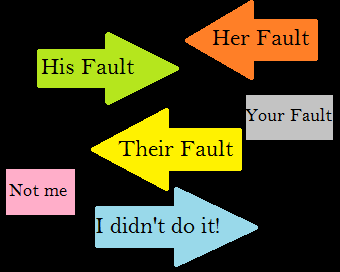Really? Take Responsibility for Your Business?
Do you want excellence in your business? Or,is your work life smoke and mirrors? Do you want to throw around buzzwords? After all, it is really cool to use various buzzwords and phrases (reach out, I am aligned). It’s hip. These are the buzzwords that people like the throw around because it feels good. It’s true that a lot of lingo is not abrasive. But, the bottom line is that you need results in your business.
Here is a good example of a phrase that was in fashion at one point, “take responsibility!”
But be honest. Are you really taking responsibility yourself? What are you really doing to be effective in your workplace? Are you being thorough? Really? Or, is this, the pot calling the kettle black? Do you really want an excellent company? Or, do you want to blame, point fingers and deny?
Buzzwords can be like an empty suit. You look good, but there ain’t much going on inside. Fashion can be armor. You are wearing every possible societal approved garment. You have no chinks in your armor. But, inside you might be an emotional mess (that’s another story).
And, words can be armor also. What is beneath it all? The words may sound like you are hip and “on point,” but you really need to adjust your game. Taking responsibility  is the same way. The good news is that when you do, ‘take responsibility, there are a lot of ‘wins’ along the way.
is the same way. The good news is that when you do, ‘take responsibility, there are a lot of ‘wins’ along the way.
E-mails – are you taking responsibility with your email messages?
I am amazed at how unclear people are in their emails. How can you effectively lead if you send a half baked request to your employees? Be clear in your requests. It’s really a bit comical. The manager sends a poorly written request. The baffled employee attempts accomplishment, but fails.
What employee wants to admit that they don’t understand? They blame themselves. The manager responds in a crazed rage toward the employee. Worse yet, the manager blames the employee for not asking for clarity. “Aw, you should have asked!”
Here is a general overview of the scenario. A poorly written training program (most companies have them – if you don’t realize this then we’ll have to direct you to the denial article) and a poorly delivered training program yields poorly trained reps. That would seem to make sense. Enter the manager and the anger at poor performance.
Someone has to take responsibility.
Presentations
I watched a speaker give a presentation. From my seat in the front of the room, I could see the eyes of the audience. Wait, I would not see their eyes – I saw their eye lids. Sleeping – tipping over like cows in a pasture. In a professional atmosphere, I don’t suppose this is acceptable. Would you agree? Who is at fault here?
You know where I am going with this, but before we answer that, let’s point out the kicker. The boss of the speaker became enraged at the audience members (the employees) for falling asleep. Ho hum.
Look. The presentation was boring. The presenter had done a nice job preparing. He was organized. But, in the world in which we live, there is a wealth of information on how to engage an audience, how to communicate effectively and how to deliver information so it sticks.
So, it’s not responsible to deliver a presentation, or any message, that does not get to the “end user.” Communication is not the words uttered, but the words received.
Managers
I see “managers manage.” Ho hum. Generally their direction is unclear. Then there is the manager yelling. I actually saw the word “appalled” used the other day. In a company where you are hemorrhaging money and energy (erg’s) like there is no tomorrow, being appalled at a broken fingernail is probably not the best place to put your energy.
In the case of the appalled manager, her direction was unclear. The systems did not support the employee. You know the story. With the lack of tools and with incomplete information, the employee had little choice but to fail. How are you setting up your employees? For success? Or, for failure?
The point is to look in the mirror first. Make your that the glass house in which you are living is solid. Then deliver information in a responsible way. Connect with your employee. If you deliver information responsibly and clearly, then you will never have a need to raise your voice or be appalled (or enraged or…).
